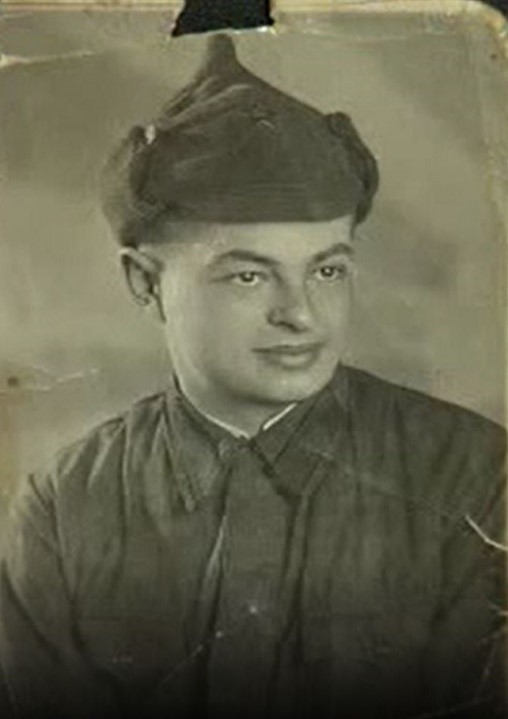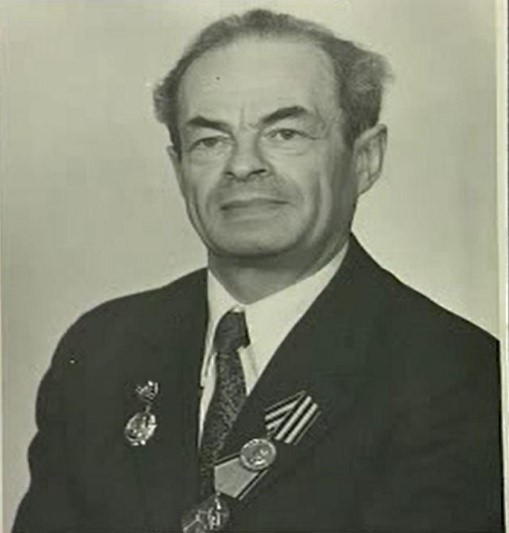Lazar Muchnik was born in 1922 in Berdichev, Ukraine. His father Usher (Asher) was an economist; he worked in various enterprises, such as the local branch of the state bank, but in 1930 he moved to Kremenchuk, where he taught foreign languages. His mother Gitle had graduated from a medical institute by correspondence. In 1940, upon finishing school, Lazar was drafted into the Red Army and sent to the town of Horodenka in the recently annexed southeastern Poland, now Western Ukraine. Muchnik was deemed to be of "limited fitness" for military service; therefore, he was attached to the local recruitment office in Horodenka, where he carried out purely clerical work. To his distress, he learned that the local population, both the Poles and the Ukrainians, hated the Soviet military. For this reason, despite being only a private, Muchnik was issued a personal pistol.
With the beginning of the Soviet-German War on June 22, 1941, Muchnik had more work at his recruitment office. However, a few days later the office was evacuated to a suburb of Kiev. There, Lazar, being an experienced military clerk, was attached to the Operative Department of the HQ of the 23rd Separate Rifle Brigade, where he was promoted to the rank of lieutenant; his mother Gitle Mazina volunteered to serve in the Red Army as a physician. The 23rd Brigade was transferred to the Volkhov Front, east of Leningrad (St. Petersburg). There, the clerical worker Muchnik had to dig bunkers for the brigade headquarters in the heavy cold. The brigade was unable to cross to the west bank of the Volkhov River. In March 1942, the 2nd Shock Army, to which the 23rd Rifle Brigade was subordinated, found itself encircled by the Germans. The situation was desperate: The food supplies airdropped by Soviet planes were immediately stolen by the local peasant population; in May 1942, the soldiers ran out of ammunition. In June 1942, while attempting to break out of the encirclement in boggy terrain, the 23rd Brigade was captured by the Germans. Muchnik recalls that he was standing up to his chest in bog water when he saw German soldiers in front of him. At the last moment, he was able to cut off his belt under the water, thereby ridding himself of the wallet containing his documents.1
Fortunately, since the Germans had taken too many POWs (the entire 2nd Shock Army), they limited themselves to the ritual cry of "Communists and Jews, one step forward!", and did not bother to ascertain which of the prisoners were actually Jewish. Muchnik registered himself as "Lazar Muchnikov", an ethnic Russian; he kept his Jewish first name, Lazar, because he realized that his former comrades-in-arms, who had been captured along with him, might continue to call him "Lazar" out of habit, and the fact that he had reported another first name might attract suspicion. As a POW, Lazar Muchnik went through various camps in the Baltic countries and in Germany, where he worked mainly in mines and quarries. In April 1945, as a column of POWs, including Muchnik, were being driven to another camp, they were liberated by an advancing U.S. tank unit in the vicinity of Göttingen. On May 9, 1945, the Americans handed Muchnik over to the Soviets in Magdeburg. After a long screening by the Soviet anti-spy agency "SMERSh" (part of the screening process took place at the former Sachsenhausen concentration camp), Muchnik was restored to the rank of lieutenant, and discharged from the army shortly thereafter.
Lazar's father and mother survived the war. Afterward, they decided not to return to Berdichev, where all their relatives had been killed. Instead, they settled in Dnepropetrovsk (present-day Dnipro, Ukraine), where Lazar entered a technical institute (university). Later, Lazar Muchnik moved to Sverdlovsk (present-day Yekaterinburg, Russia).
- 1. YVA O.93/35627








